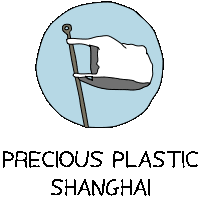
It was a real pleasure meeting Ms. Adele and learning about her work with Precious Plastics Shanghai. I found it very cool that she was able to turn her plastic recycling hobby into an interactive educational resource for organisations across Shanghai. It is quite a unique business model that they have managed to create, all enabled through open-source knowledge. Coming from a data science perspective (where I heavily rely on open-source software), I see similar, open-source initiatives like Precious Plastics as gems because they empower grassroots organisations/groups with tools that can be customised to fit their local context.
In thinking about the impact of such initiatives, we have already discussed in class that recycling currently does little resolve the plastic crisis. Given that Precious Plastic Shanghai does not do much recycling, their impact is largely educational – they expose people to the complexities of plastic recycling and hopefully encourage more responsible consumption and sorting of plastic. However my position is that workshops are a limited way to reach people (in terms of absolute numbers). For one, some of the places where these workshops are hosted (e.g. the ones by rich clients like Adidas) are likely quite exclusive, so it is quite a small audience that is learning about plastic. One slightly pessimistic point is that I be concerned if companies are paying for these plastic-recycling workshops simply as a form of green-washing. While I am not familiar with the culture of companies hosting pop-up workshops for their employees, I would be concerned if H&M (for example) is hosting a plastic recycling workshop to look good (to their employees/partners) but not making any real efforts to enhance their company wide sustainability reforms.
Regardless, I think that the work done by Precious Plastics Shanghai in schools and communities is an especially valuable way to remind people of the enduring problem of our plastic waste creation. Precious Plastics also shows people that there are creative and artistic ways to think about the plastic crisis without falling to a doom-and-gloom conclusion. I was curious to see if there are any plastic recycling initiatives back home in Malawi and I was excited to find out that there might even be a commercial market for plastic bottles.
Good observations Fanisi!
Although I always feel I’m kind of helping greenwashing the place where I work, I feel I cannot stop doing it for this reason.
I try to continue learning and teaching about this problem and encourage other people to do it too, but always letting them be very critical about it.
Even at precious plastic there are people who doesn’t like companies take advantage of their work for greenwashing, but on the other hand, some people also think in that way companies are still helping them to spread the word and make people more aware.
As long as we stay critical and don’t believe everything that companies are telling us, I guess we should be ok.